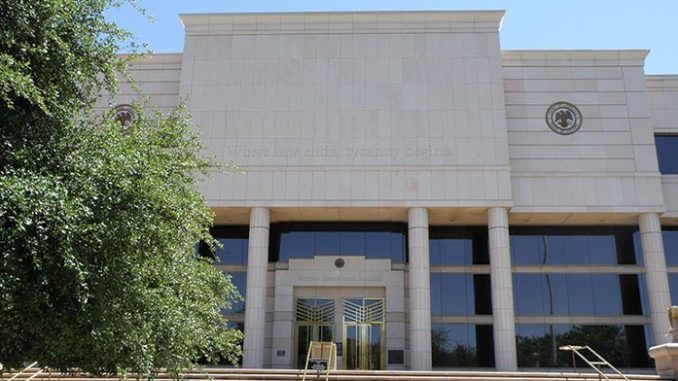
The Cochise County Board of Supervisors is arguing to the Arizona Supreme Court that a person’s “mere status” as a taxpayer is not good enough for that person to pursue legal action against the board for alleged violations of the state’s conflict of interest or open meeting laws, according to its Nov. 9 petition for review to the high court.
The petition is in response to a unanimous decision by the Arizona Court of Appeals in October that David Welch, a Sierra Vista resident, had legal standing to challenge the Cochise County board’s vote in February 2019 to appoint one of their own to a much higher-paying position as a justice of the peace for Precinct 5, better known as the Sierra Vista Justice Court.
In the petition, the county supervisors contend Welch never alleged he was a taxpayer, only a citizen and county resident within Precinct 5. But had Welch made the claim, “mere taxpayer status, without more, does not suffice,” the county argues.
“The Arizona Legislature has made clear that, for a plaintiff making claim
to a private right of action under Arizona’s conflict of interest or open meeting laws, he or she must be ‘affected by’ the alleged violation,” the petition states.
The controversy involves the appointment of Pat Call, one of the board’s three supervisors, to fill a vacancy at the Sierra Vista Justice Court. There was no advance public notice under Arizona’s open meeting law that Call, who is not a lawyer, was being considered for the position which doubled his salary nor any opportunity for public comment about Call or to advocate for other candidates.
In addition, Call took part in public discussion about how to fill the vacancy -he suggested foregoing a committee- and then attended a non-public meeting with the other supervisors just before they voted him into the position.
Arizona’s conflict of interest statute states that a “public officer or employee who has…a substantial interest in any decision of a public agency shall make known such interest in the official records…and shall refrain from participation in any manner…in such decision.”
Welch sued in Cochise County Superior Court to have Call’s appointment overturned based on violations of the open meeting law and conflict of interest statute. At the time, Welch had a criminal case pending in the Sierra Vista Justice Court.
Within weeks, the county ratified, or re-did, the appointment vote as permitted under Arizona’s open meeting law. No such ratification option is listed in the conflict of interest statute.
An out-of-county judge heard Welch’s challenge but dismissed his case in April 2019 on the basis of a lack of standing for a resident to undertake such an action. But 18 months later, the court of appeals overturned the dismissal and granted standing to Welch a mere two months before Call’s term ends.
“Welch’s interest in receiving good value for money spent is frustrated when an insider improperly participates in his own selection for a salaried public office in a process that lacks required transparency,” the appellate opinion states.
Normally that would have sent the entire case back to the superior court to reconsider Welch’s challenge. The county defendants, however, filed a petition for review with the Arizona Supreme Court. That put the entire case on hold until the justices weigh in.
After Cochise County filed the petition for review, Welch’s attorneys filed a cross-petition seeking a ruling from the justices on a ratification argument the court of appeals did not address in its October opinion.
The Cochise County Attorney’s Office provided legal advice to the county board during the meeting at which Call was appointed and for the subsequent ratification meeting. As a result, the county retained outside counsel to represent the county defendants in Welch’s case.
That attorney, Jim Jellison, has also served as appellate counsel when Welch took the matter to the Arizona Court of Appeals. Court records show Jellison is now representing the county defendants in the petition to the Arizona Supreme Court.
Cochise County officials refused in April 2019 to release a copy of Jellison’s contract. This summer, a Pima County judge ruled the contract had to be released under Arizona’s Public Records Law; the four-page contract shows Jellison charges the county board $225 per hour for his legal services and $95 per hour for paralegal service.
